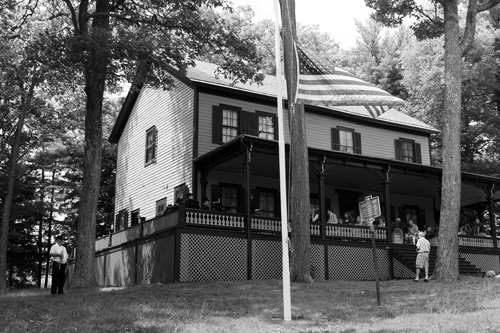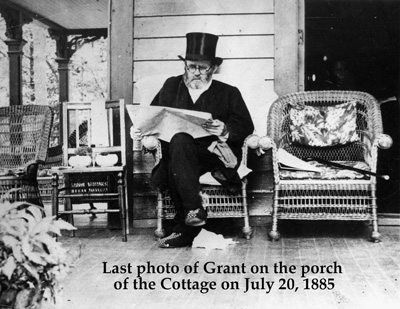News
A president’s last refuge
Its future unclear, mountainside cottage keeps Grant’s memory alive
By STACEY MORRIS
Contributing writer
WILTON, N.Y.
 On a sweltering summer afternoon, a crowd gathered near the top of Mount McGregor to pay tribute to Ulysses S. Grant.
On a sweltering summer afternoon, a crowd gathered near the top of Mount McGregor to pay tribute to Ulysses S. Grant.
The Remembrance Day ceremony at Grant Cottage, where the nation’s 18th president spent his last days, attracted dozens of history buffs from as far away as Syracuse. It was held July 23, exactly 129 years after Grant’s death.
The two-story cottage in northern Saratoga County is where Grant, the Army general who led the Union troops to victory in the Civil War before his two terms as president, found a peaceful refuge in the summer of 1885 to finish writing his memoirs as he battled throat cancer. He died at the cottage, surrounded by his family, just three days after finishing his writing.
Grant’s memoir was a commercial and literary success. Mark Twain, who was friend of Grant and served as publisher of the book, called it a “literary masterpiece.”
And the cottage quickly became a shrine to the president’s memory, a destination for Civil War veterans and their families who wanted to pay their respects. It is now maintained as a state historic site.
Lately, however, the cottage’s future has been clouded by the closing of Mount McGregor Correctional Facility, a medium-security prison on whose grounds the historic site sits. The state prison has long provided power, water and sewer service to the cottage, along with security and maintenance of the long access road leading to the property.
New York has yet to find a new use for the prison buildings, which shut down last month, but there is a proposal to have the state parks department acquire about 700 acres surrounding the prison and add the land to Moreau Lake State Park, which is just to the north.
Although the state owns the land and building, Grant Cottage has been run for the past 25 years by a private nonprofit group, Friends of Ulysses S. Grant Cottage. Its 10-acre site includes a walking trail, gift store and a small museum. The trail leads to an overlook with a sweeping view of the Hudson Valley.
 Desperate to write
Desperate to write
The cottage’s muted interiors have been left carefully intact for nearly 130 years.
“Everything has been kept the way it was in July of 1885, which makes for a special experience for those interested in Victorian history,” said Tim Welch, president of the Friends of Ulysses S. Grant Cottage.
On guided tours of the cottage’s first floor, visitors are asked view Grant’s personal items on the confines of carpet runners, put in place to preserve the home’s original floral-pattern carpeting. A glass cabinet holds the president’s moustache brush, white bedclothes, a blood pressure cuff, and a small iron juicer.
Grant was already seriously ill when he traveled to Mount McGregor in June 1885.
“By the time he arrived, Grant had lost his ability to speak,” Welch said. “He couldn’t eat either, but he could drink.”
Welch said that in Grant’s final days, he relied on the pencil to become his primary form of communication.
“He finished his memoirs in pencil and wrote notes to everyone on yellow-lined paper and pencil,” Welch said. “Many of those notes were saved and are on display at the cottage.”
Despite his illustrious career and many admirers, Grant was broke by the time he arrived in Wilton. He had lost his life savings and more in the collapse of his son’s investment firm, which had carried out what today would be characterized as a Ponzi scheme.
With the backing of wealthy friends including the Vanderbilts, Grant and his family were given a midtown Manhattan brownstone to live in. When the Drexel family of Philadelphia heard that Grant was ailing and in need of a quiet, fresh air getaway, they offered the family use of their cottage on Mount McGregor.
Completing his memoir was a financial imperative for Grant, who wanted to provide for his family after his death. It worked; the memoir yielded more than $400,000 in royalties for Grant’s widow under a generous book deal set up by Twain.
Sleeping upright
Welch said that the fact that Grant’s life story is cinematic in scope is what keeps the mystique of it thriving through the decades.
“The cottage isn’t just a shrine; people come here because it’s a great story,” he explained. “We like to represent it as a place where Grant won two battles: He conquered throat cancer; he conquered poverty.”
Grant was so intent on finishing his memoirs that he retreated to the mountains in hopes of prolonging his life.
“Doctors thought he was going to die in April,” Welch said. “Mount McGregor is the highest point in Saratoga County, and he felt the fresh air and peaceful surroundings would do him good.”
Unable to lie down in bed because of the condition of his throat, Grant slept upright in two pushed-together leather armchairs in his study.
“He came to the cottage with two doctors who used cocaine water to bathe his throat as an analgesic, and inoculated him through an IV with brandy to regulate his heartbeat. He beat death to complete his memoirs.”
When the two-volume book was published, it sold 300,000 copies during the first year and has never been out of print.
“It netted the equivalent of $11 million today,” Welch said.
In the days before Grant’s death, a throng of well-wishers and admirers gathered along the road leading to the cottage.
“While Grant was writing his memoirs, there were people camped out on the mountain to see how he was doing,” Welch said. “The newspapers gave reports on his health every day, and The New York Times filed reports on his health regularly.”
When Grant died at 8:08 a.m. on July 23, his eldest son, Frederick, broke the news to the crowds.
General with a soft heart
On Remembrance Day of this year, a group of re-enactors portraying Grant’s immediate family gathered at the end of the cottage porch to recreate the announcement of Grant’s death.
Steve Trimm of Albany delivered the news as Frederick and paid tribute his father with a moving and biographically expansive eulogy that included an ancestral history of both parents and some little-known facts. Among them:
• Grant was the slave-trade-hating son of an abolitionist who married a Southern belle whose family owned slaves, and despite the improbable odds, Ulysses S. Grant and Julia Dent shared a passionate and enduring love for one another;
• While in office, Grant saw to it that the first black officer was put on the District of Columbia police force;
• Grant was an involved parent who decried corporal punishment, instead offering the stinging proclamation that his children had “disappointed” him when they transgressed;
• Despite his stoic stance in portraits, the general possessed an infectious sense of humor; and
• Grant was a soft-hearted animal lover who couldn’t bring himself to hunt.
Trimm also portrays President Grant and will be doing so with a Mark Twain re-enactor Sept. 13-14 in the program “Sunset on Mount McGregor” at the cottage. He began his re-enactment tenure after taking a tour of Grant Cottage a decade ago.
“I discovered that everything I thought I knew about Grant was wrong,” Trimm said. “He was such an admirable man, and there are so many aspects of him we could all learn from.”
An unmistakable wistfulness seemed to blow through the pines as Civil War honor guards marched to the flagpole next to the cottage to raise the American flag to half-staff.
At the mountain’s base was a world embroiled in conflict of all stripes and sizes, from confiscated flags on the Brooklyn Bridge to the shot-down commercial airplane in Ukraine to renewed strife in the Middle East. The indications were many that afternoon that the world is more volatile than the one Grant left behind.
Yet Welch says people are still drawn to Grant’s story, perhaps because there remains hope that there are still leaders of the same level of integrity to guide the world through today’s conflicts.
The Remembrance Day ceremony this year took on added significance because it took place just three days before the closing of the Mount McGregor prison.
“The top of Mount McGregor will be a very desolate place after the closing,” Welch said. “We’re concerned that there could be looting or disturbances, just as there were similar concerns 129 years ago after Grant died. We don’t have any final solutions yet, though the prison has promised not to turn the lights off until the season ends on Columbus Day weekend.”
But Welch said he is confident of the site’s future. To this day, he said, there are too many people who are fascinated by Grant’s legacy to let it fade away.
“We’ve been setting paid attendance records every year,” he said. “Last year we had 5,300 paid visitors. There’s a great story here, and people want to experience it.”
Several lectures and re-enactment events are scheduled though Columbus Day weekend at Grant Cottage. For more information or to donate to the cottage’s operations fund, visit www.GrantCottage.org.

